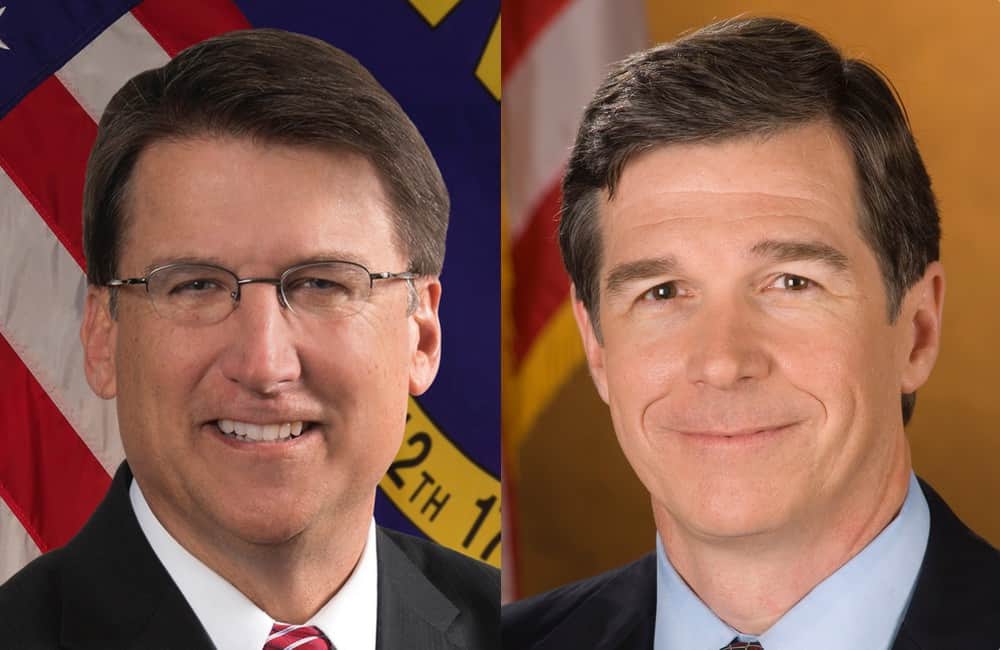
From time to time over the past year, I have written that North Carolinians “have a right to expect a full-throated debate over education” in the 2016 state elections. Now in the candidacy-filing period, the time has arrived to begin actually monitoring the tone and texture, content and context of the education debate.
Republican Governor Pat McCrory has formally announced his candidacy for re-election, and Democratic Attorney General Roy Cooper has declared his candidacy for governor. Though both have opposition within their own party, it is clear that McCrory and Cooper are poised to emerge from the March primaries as the two principal contenders.
At this stage, 11 months before the 2016 election day, the debate is not fully joined, and certainly not full-throated. Still, the ways in which both McCrory and Cooper have opened their campaigns offer an initial glimpse into their basic themes.
In an announcement video that runs just short of three minutes, the governor says his first-term goals were to “fix our government” and “to rebuild our state” in the aftermath of the Great Recession that burdened North Carolina with one of the highest unemployment rates in the nation. In the video, which contains a few photos of the governor with school children, McCrory defines his education goals broadly: “improve our education system, support our teachers, and help our students graduate with the knowledge and skills they need to succeed.”
As an incumbent, McCrory has a record to explain and defend. The McCrory campaign provides its explanation of his education record on its website, in which it refers to McCrory as “Governor Pat.” The campaign puts a special emphasis on teachers and their pay: “Under Governor Pat’s leadership, North Carolina gave teachers the largest teacher pay raise in the country. In 2014, the average salary for teachers in North Carolina increased more than any other state in the nation.”
In addition, the governor embraces key portions of the education agenda that arose from the Republican legislative majority. The campaign notes that he signed the law providing state-funded vouchers for low-income students in private schools; that “Governor Pat funded the Read to Achieve program,” requiring third graders to meet a reading standard, or be retained in that grade for another year; and that he also signed the law designed to replace Common Core.
As the standard-bearer of the opposition party, Cooper has the task of critiquing the incumbent administration and defining a convincing alternative for voters. He announced his candidacy with a speech in Rocky Mount that contained his own rebuilding theme — rebuilding public education from the onslaught of Republican budgeting and policymaking. Several days later, the North Carolina Association of Educators, the state’s largest organization of teachers, endorsed Cooper.
Speaking specifically of McCrory, the Democratic candidate said, “He won’t find a way to keep good teachers but he finds a way to pass tax-giveaways to corporations.”
Speaking more generally about Republican policy, Cooper declared, “Our schools are starved for resources. Our best and brightest teachers are leaving for better pay and more respect … We need to make education a priority again — a strong K through 12 system that values our teachers and gives our children the resources they need.”
I am not one to dismiss campaign rhetoric, from which you can get a sense of a candidate’s basic approach to voters. At rallies, in videos and in TV commercials, candidates attempt to motivate voters; they speak in broad thematic strokes rather than policy-specific terms. What you learn from the rhetoric so far is that the governor’s race will indeed feature a direct clash over education.
But there is also a time for policy-rich speeches and position papers — and we need them from both McCrory and Cooper. There is also a time for in-depth interviews as well as for face-to-face debates.
Issue-laden speeches, papers, and interviews may not motivate voters in the same way as emotive rhetoric, but it’s in the interest of democratic decision making for candidates to spell out an agenda for voters — there should be a link between campaigning and governing.
As the campaign progresses, I intend to turn regularly to examining and commenting on the agendas, the rationales, the data, the divisions that define the choice between McCrory and Cooper. And my EdNC colleagues will also offer regular coverage of education in campaign 2016.
We see our mission as providing common-ground for the great education debate.


